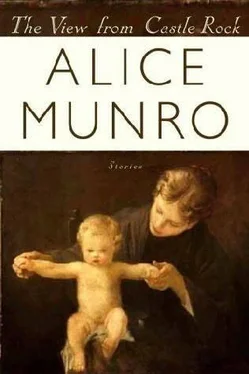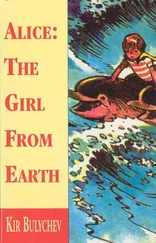Raymond, a boy about ten years old, came around the corner of the barn. He had a stick but he was just tapping the cows’ rumps with it, pushing them and saying, “So-boss, so-boss,” in an easygoing rhythm and urging them towards the stable door. It was the sort of mixed herd most farms had at that time. A black cow, a rusty-red cow, a pretty golden cow that must have been part Jersey, others splotched brown and white and black and white in all sorts of combinations. They still had their horns, and that gave them a look of dignity and ferocity which cows have now lost.
A man’s voice, Bunt Newcombe’s voice, called from the stable.
“Hurry up. What’s the holdup? Do you think you’ve got all night?”
Raymond called back, “Okay. O-kay. ” The tone of his voice did not indicate anything to me, except that he didn’t seem scared. But Dahlia said quietly, “Yah. He’s giving him lip. Good for him.”
Bunt Newcombe came out of another door of the stable. He was wearing overalls and a greasy barn smock, instead of the buffalo coat I thought of as his natural costume, and he moved with an odd swing of one leg.
“Bum leg,” Dahlia said, in the same quiet but intensely satisfied voice. “I heard Belle kicked him but I thought it was too good to be true. Too bad it wasn’t his head.”
He was carrying a pitchfork. But it seemed he meant no harm to Raymond. All he used the fork for was to pitch manure out of that doorway, while the cows were driven in at the other.
Perhaps a son was abhorred less than his daughters?
“If I had a gun I could get him now,” Dahlia said. “I should do it while I’m still young enough so’s I’m not the one that ends up hung.”
“You’d go to jail,” I said.
“So what? He runs his own jail. Maybe they’d never catch me. Maybe they’d never even know it was me.”
She couldn’t mean what she was saying. If she had any such intentions wouldn’t it be crazy of her to tell me about them? I could betray her. I would not intend to, but somebody might get it out of me. Because of the war I often thought of what it would be like to be tortured. How much could I stand? At the dentist’s, when he hit a nerve, I had thought, if a pain like that went on and on unless I betrayed where my father was hiding with the Resistance, what would I do?
When the cows were all inside and Raymond and his father had shut the stable doors we walked, still bent, back through the sumacs and once out of sight we climbed down to the road. I thought that Dahlia might say now that the shooting part was only kidding, but she didn’t. I wondered why she had not said anything about her mother, about being worried for her mother as she had been for Raymond. Then I thought that she probably despised her mother, for what her mother had put up with and what she had become. You would have to show some spirit to make the grade with Dahlia. I wouldn’t have wanted her to know that I was afraid of the horned cows.
We must have said good-bye when she took the route back to town, to Gloria’s house, and I turned onto our dead-end road. But perhaps she just walked on and left me. I kept thinking about whether she could really kill her father. I had a strange idea that she was too young to do that-as if killing somebody was like driving a car or voting or getting married, you had to be a certain age to manage it. 1 also had some idea-though I would not have known how to express it-that killing wouldn’t be any relief to her, hating him having got to be such a habit. I understood that she had taken me along with her not to confide in me or because I was anything like an intimate friend-she just wanted somebody to see her hating him.
On our road there had been at one time perhaps a dozen houses. Most were small cheap rental houses-until you got to our house, which was more of an ordinary farmhouse on a small farm. Some of those houses were on the floodplain of the river, but a few years ago, during the Depression, they had all had people living in them. Then the war jobs, all sorts of jobs, had taken these families away. Some of the houses had been carted elsewhere to serve as garages or chicken sheds. A couple of those left were empty, and the rest were mostly occupied by old people-the old bachelor who walked into town every day to his blacksmith shop, the old couple who used to have a grocery store and still had an Orange Crush sign in the front window, another old couple who bootlegged and buried their money, it was said, in quart sealers in the backyard. Also the old women left on their own. Mrs. Currie. Mrs. Home. Bessie Stewart.
Mrs. Currie raised dogs who raced about barking insanely all day in a wire pen, and at night were taken inside her house which was partly built into the bank of a hill, and must have been very dark and smelly. Mrs. Home raised flowers, and her tiny house and yard in the summer were like an embroidery sampler-clematis vines, rose of Sharon, every sort of rose and phlox and delphinium. Bessie Stewart dressed smartly and went uptown in the afternoons to smoke cigarettes and drink coffee in the Paragon Restaurant. Though unmarried, she was said to have a Friend.
One empty house had been occupied by, and still belonged to, a Mrs. Eddy. For a short while, years ago-that is, four or five years before I ever met Dahlia, a long time in my life-some people named Wainwright had lived in that house. They were related to Mrs. Eddy and she was letting them live there, but she wasn’t living with them. She had already been taken away to wherever she was taken. It was called Care.
Mr. and Mrs. Wainwright came from Chicago, where they had both worked as window dressers for a department store. The store had closed down or it had been decided that it didn’t need so many windows dressed-whatever had happened, they had lost their jobs and come here to live in Mrs. Eddy’s house and try to set up a wallpapering business.
They had a daughter, Frances, who was a year younger than I was. She was small and thin and she got out of breath easily, because she had asthma. On the first day of my being in Grade Five, Mrs. Wainwright came out and stopped me on the road, with Frances lagging behind her. She asked me if I would take Frances to school and show her where the Grade Four room was, and if I would be her friend, because she didn’t know anybody yet or where anything was.
Mrs. Wainwright stood talking to me, right out on the road, in a silky light-blue wrapper. Frances was all dolled up in a very short checked cotton dress with a flounce around the skirt and a matching checked hair ribbon.
Soon it became understood that I would walk to school with Frances and walk home with her afterwards. We both carried our lunches to school, but I had not expressly been asked to eat lunch with her so I never did.
There was one other girl in the school who lived far enough away to have to bring her lunch. Her name was Wanda Louise Palmer, and her parents owned and lived in the dance hall to the south of town. She and I had always eaten together, but we had never thought of ourselves as friends. Now, however, a kind of friendship was formed. It was all based on avoiding Frances. Wanda and I ate in the girls’ basement, behind a barricade of broken old desks that were heaped up in a corner. As soon as we were finished we sneaked out and left the school grounds to walk around the nearby streets or go downtown and look in store windows. Wanda should have been an interesting companion because of living at the dance hall, but she was so apt to lose track of what she was telling me (though not to stop talking) that she was very boring. All we really had was our bond against Frances, and our desperate held-in laughter when we peered through the desks and saw her looking for us.
After a while she didn’t do that anymore, she ate her lunch upstairs in the cloakroom, alone.
Читать дальше












